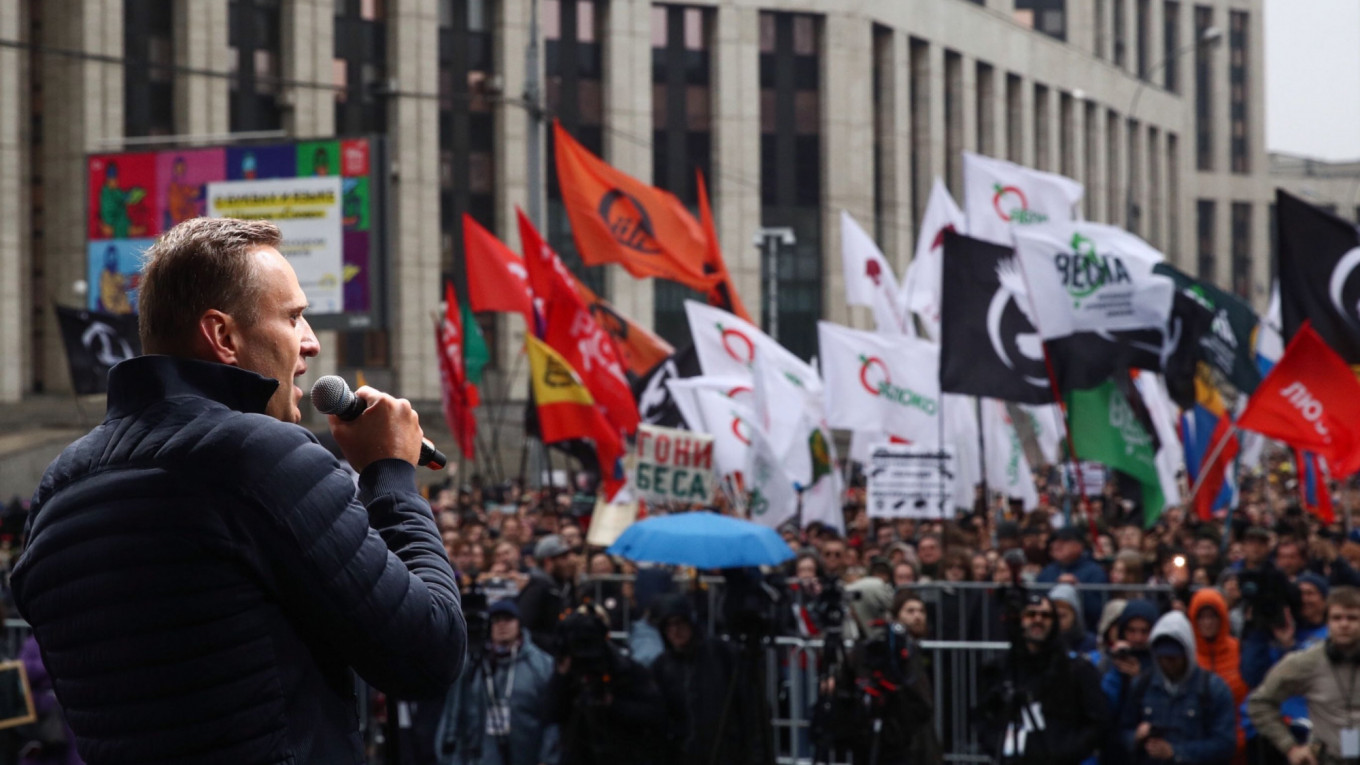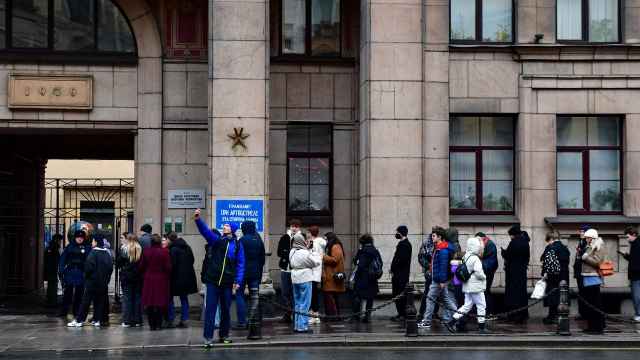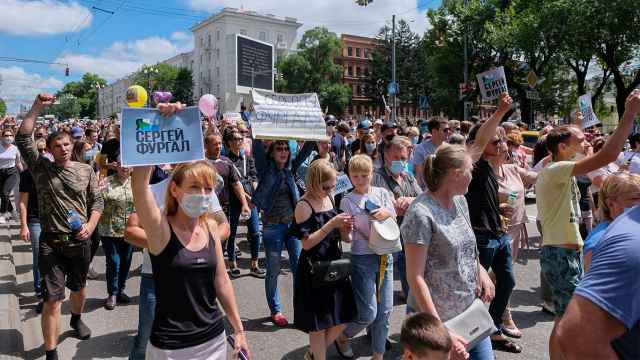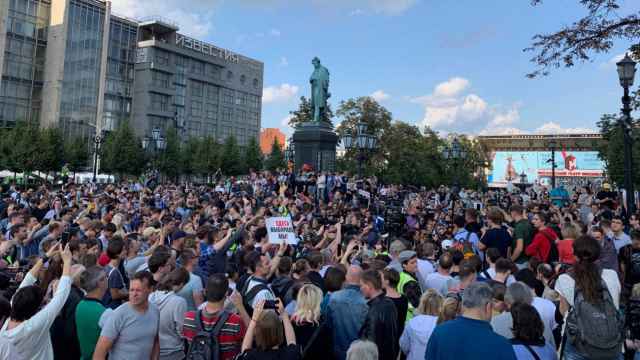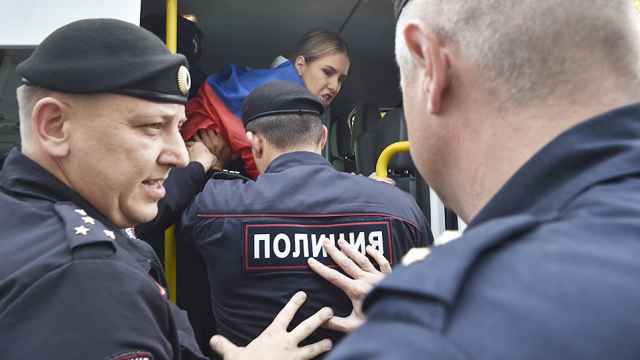The elections that triggered Moscow’s summer protest movement have come and gone, but Russia’s opposition is now focused on a new task: freeing those caught up in the Kremlin’s crackdown.
With 14 people facing up to eight years behind bars for their roles in the demonstrations for fair elections, Russians from all walks of life have demanded their release. And after an unprecedented public outcry in recent weeks, prosecutors have dropped criminal charges against six of the defendants.
The opposition, sensing momentum, has been left wanting more. On a cold and rainy Sunday afternoon, thousands rallied in central Moscow to demand that authorities free the rest.
“Why did they release those they have released?” Russia’s most prominent opposition politician Alexei Navalny asked the crowd from the stage. “Because they are scared of falling ratings. Because they see people won’t support them for this.”
In July, after election commission officials barred a host of opposition politicians from balloting in the recent Moscow City Duma elections, thousands took to the streets for the largest protests in years in the Russian capital.
At the movement’s peak, which came after protests this year across Russia over declining living standards that has led to falling ratings for President Vladimir Putin and the ruling United Russia party, some 50,000 turned out for a single rally.
But the authorities cracked down, temporarily detaining some 2,400 protesters and opening criminal investigations into mass unrest. The movement fizzled by the end of August.
Five people have so far been sentenced for their roles in the rallies. Kremlin opponents see the jail terms as aimed at putting down future dissent. One of those sentenced, Kirill Zhukov, 28, will spend three years behind bars for lifting a policeman's visor.
The response from the authorities has recalled the crackdown on the 2011-2012 Bolotnaya protests, the last wave of anti-government demonstrations in the Russian capital. But what has stood out this time around, political analysts say, is that Russian civil society has awakened in response.
Over recent weeks, groups of professionals ranging from teachers to doctors to Orthodox priests have signed open letters demanding the release of those sentenced.
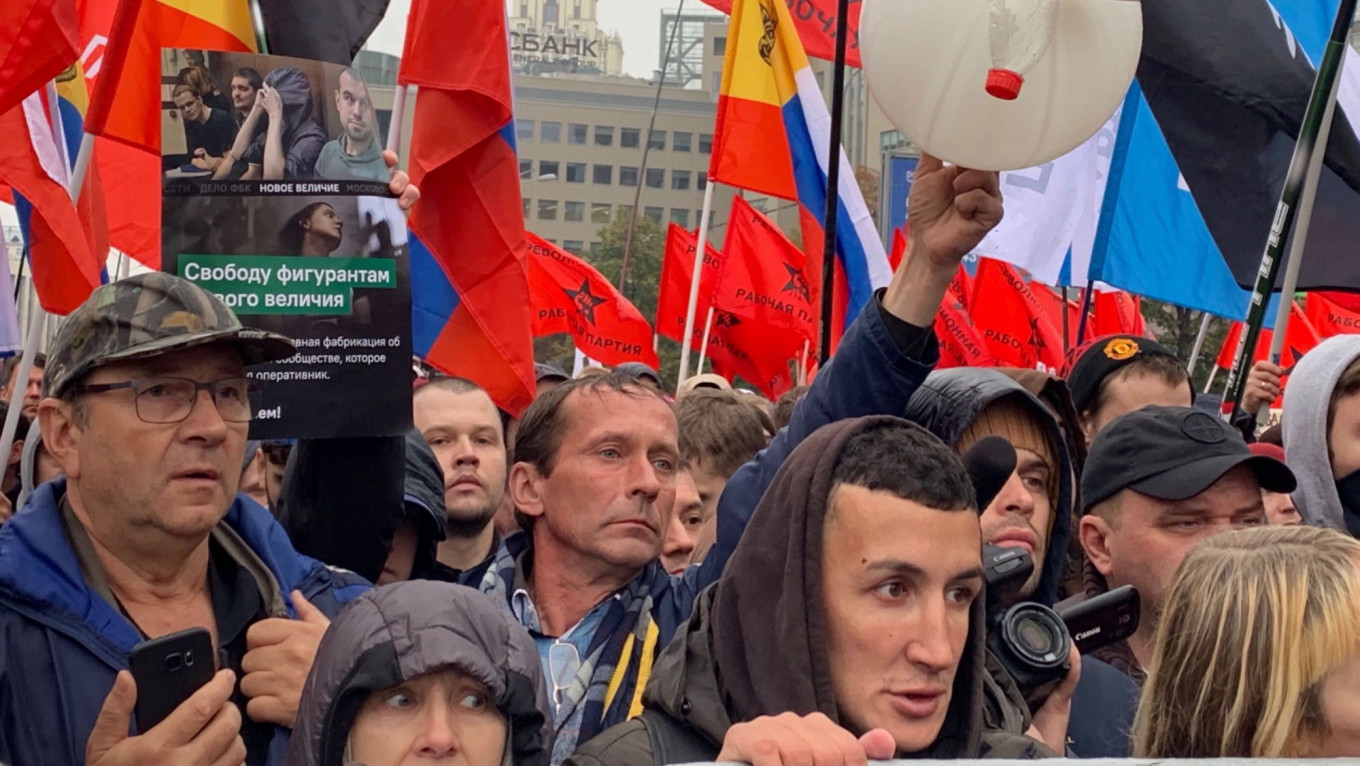
Earlier this month, actors picketed outside of the presidential administration demanding that Pavel Ustinov, 23, who was sentenced to three and a half years in prison for allegedly dislocating a police officer’s shoulder, be freed. He was released on house arrest soon after.
“This has happened in Putin’s Russia before, but as a rule this was tied to social or economic demands like low salaries,” said political analyst Maria Lipman. “It is unprecedented that we are seeing these groups speaking out against injustice.”
In recent days, prosecutors have dropped charges or released on house arrest a number of those facing time behind bars. One, Alexei Minyaylo, 23, went immediately to the single-person picket on Thursday afternoon — a legal form of protest in Russia — outside of the presidential administration building that has been taking place all week, and continued Sunday night.
At the demonstration on a street named after the Soviet dissident Andrei Sakharov on Sunday afternoon, Minyaylo said that many people told him he was stupid for risking arrest once again.
“Of course I am scared,” he said from the stage alongside three other defendants who had charges against them dropped. “But I am even more scared of living in fear.”
The demonstration — which was approved by the authorities and saw no arrests — drew 25,200 people, according to White Counter, an NGO that tallies up participants who have passed through the security frames surrounding approved rallies. Moscow police counted around 20,000.
Speakers during the rally included Navalny and his allies Ivan Zhdanov and Lyubov Sobol, opposition candidates who were barred from running in the city council elections. Sobol, who spent 32 days on hunger strike in protest of the decision, became the face of this summer’s protest movement. Mikhail Svetov, the leader of the Libertarian Party, which organized the demonstration, also addressed the crowd.
But the stars of the day were those who had been freed. Speaking from the stage, they thanked the protesters for doing their part to secure their release.
Vladislav Barabanov, 22, who was released on Sept. 3, noted during his speech that, although he is from Nizhny Novgorod, a city some 400 kilometers east of Moscow, he has stayed in the capital to support the other defendants. He called for others to continue doing whatever they can until the rest of the defendants are freed.
“Every hour, every minute, every second we should all be doing something to show maximum solidarity with the people caught up in this repressive machine,” he said.
While some activists have felt that they have influence on the Kremlin, that may only be to a small degree, and solidarity might be the only thing people can offer now, said political analyst Tatiana Stanovaya.
“It’s very important to understand that there has not been a liberalization,” she said. “The authorities are making corrections where they can, but they are not reforming the system.”
Stanovaya pointed to the case of Yegor Zhukov, a 21-year-old blogger who captured public sentiment this summer, and has been moved to house arrest until Dec. 27. Because he was an activist and not a bystander caught up in the authorities’ dragnet, Stanovaya believes public pressure is unlikely to have an influence on his ultimate ruling.
But protesters on Sunday said they will not be dissuaded.
“The dragon has unclenched its jaws, but not all the way,” said Larisa Solovova, 45. “We have to keep going.”
A Message from The Moscow Times:
Dear readers,
We are facing unprecedented challenges. Russia's Prosecutor General's Office has designated The Moscow Times as an "undesirable" organization, criminalizing our work and putting our staff at risk of prosecution. This follows our earlier unjust labeling as a "foreign agent."
These actions are direct attempts to silence independent journalism in Russia. The authorities claim our work "discredits the decisions of the Russian leadership." We see things differently: we strive to provide accurate, unbiased reporting on Russia.
We, the journalists of The Moscow Times, refuse to be silenced. But to continue our work, we need your help.
Your support, no matter how small, makes a world of difference. If you can, please support us monthly starting from just $2. It's quick to set up, and every contribution makes a significant impact.
By supporting The Moscow Times, you're defending open, independent journalism in the face of repression. Thank you for standing with us.
Remind me later.



